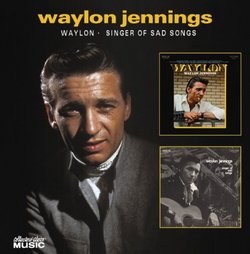Waylon Jennings starts to dig in his heels
hyperbolium | Earth, USA | 01/13/2010
(4 out of 5 stars)
"By the time Waylon and Singer of Sad Songs were released in 1970, a number of things had changed in RCA's approach to recording Waylon Jennings. Chet Atkins had turned production over to Danny Davis, with whom Jennings was more able and willing to butt heads, and by the second album, Jennings' Phoenix compatriot Lee Hazlewood was brought in to replace Davis. Jennings himself had shown sparks of independence from Nashville's way of doing things on his previous couple of albums, but here he stretches ever further, picking classic and new rock `n' roll songs and material from Mickey Newbury, Tom Rush, and Tim Hardin. Nashville and the general music industry had changed as well, with lusher productions starting to give way to singer-songwriters whose voice and songs were made the central focus.
Unfortunately these changes didn't immediately lead to the radical changes Jennings would introduce a couple years later, and winning songs like Liz Anderson's "Yes, Virginia" are still infiltrated by background cooing and over-arranged answer vocals. On the other hand, Jennings opens Waylon with "Brown Eyed Handsome Man," a 1956 Chuck Berry song that had been a 1956 R&B hit on the Chicago-based Chess label. He apparently knew which way the musical winds were blowing as the single charted to #3. Jennings lets fly his abilities to sing tender folk and pained blues, with the bass and drums occasionally matching his assertiveness. Mickey Newbury's "The Thirty Third of August" has a fantastic arrangement of acoustic guitar, high-string bass, drums, organ and strings; this sounds little like Nashville product and carries the song's heavy lyrics. The album is uneven and dated by dabs of electric sitar, but it was the most satisfying statement of Jennings direction to that date.
Jennings' third album for RCA in 1970, Singer of Sad Songs, was waxed over three days in Los Angeles with fellow former-Phoenician Lee Hazlewood and a few West Coast musicians. Hazlewood had just come off releasing the International Submarine Band's Safe at Home on his LHI label, so he was in a better position to understand Jennings' new ideas than the RCA staff in Nashville. The album's only hit, and the only track produced by RCA's Danny Davis, is the title song, which stopped short of the Top 10 at #12. Much better are a spirited cover of Chris Kenner's 1957 "Sick and Tired" that trades the originals New Orleans R&B bounce for Jennings' merger of country, folk, rock and soul. He covers the Louvin Brothers' "Must You Throw Dirt in My Face" and the vintage "Ragged But Right," and picks several contemporary folk songs. Jennings sounds relaxed and plugged in to his song choices, though his cover of the Rolling Stones "Honky Tonk Woman" feels forced and slightly off the mark.
Both albums, but particularly Singer of Sad Songs, are the statements of a musician born to the early West Texas rock `n' roll of Buddy Holly, developed in the bars of Arizona, and steeped in country classics. Though he'd yet to fully break free of RCA and Nashville's restrained way of doing things, his song selections planted the seeds of what was to come. Waylon appears to have been previously reissued on the American Beat label, but is no longer in print. Singer of Sad Songs makes its domestic CD debut here, providing an answer to the question "what album features a duet between Waylon Jennings and Lee Hazlewood?" Collectors' Choice's two-fer includes an eight-page booklet with full-panel reproductions of both album covers - front and back - and new liner notes by Colin Escott. This is a great way to introduce yourself to Jennings' budding outlaw years. [©2010 hyperbolium dot com]"


 Track Listings (22) - Disc #1
Track Listings (22) - Disc #1